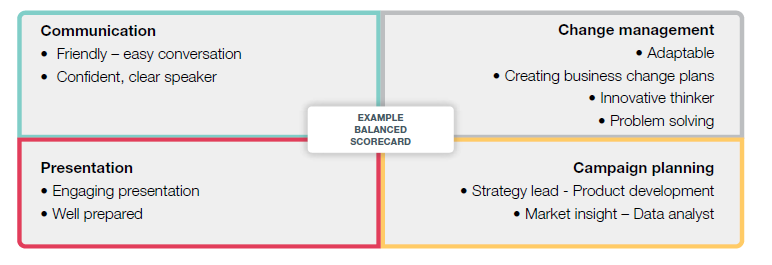Talent Trends 2025
Gain a competitive hiring advantage by learning what top talent wants.


The recruitment process has changed significantly as a response to the Covid-19 pandemic. As companies have adapted to this new way of working, many are now continuing to carry out some or all of their processes remotely as part of the ‘new normal’. This does not just refer to conducting virtual job interviews but also the assessment and testing of candidates.
Here, we will look at the best ways to assess candidates remotely to ensure you are hiring the talent you need to drive your business forward.
A balanced scorecard approach to a candidate assessment offers a structured model to review your top candidates with. How does it work? Base your analysis on four to six of the core competencies you are searching for in an ideal candidate and use the findings from your interview to compare the applicants. Once you have defined the essential skills, use these competencies as the key categories for your assessment. Then based on a candidate’s CV and interview, list the skills, experiences, working examples and personal characteristics that the candidate possesses which fall under each of those categories.
For example, if one of the key competencies listed is ‘develop a change management plan’, you might list experience such as internal and external communication, stakeholder engagement, strategic planning, adaptable, innovative and/or professional along with relevant past roles and examples discussed in the interview.
At Michael Page, we believe it is important to start a remote interview process with a definitive list of core skills, and to help navigate this we created a guide on how to run your recruitment processes remotely. Soft skills, in particular, can be quite broad, so if you do not prepare properly, you risk conducting an interview with too many in mind and without a clear priority. In that situation, it can be difficult to discount a soft skill, so prioritising is key.
If you adopt this method correctly, you will have a snapshot of each of your top candidate’s skills and capabilities that match your defined core list of skills for the role.
This is valuable for a number of reasons:
The key to a successful interview is in the preparation. To avoid biases, approach an interview with a clear set of skills to assess, with a weighting of importance applied. As well as a good set of questions that allow the keys skills to be demonstrated and discussed. In doing this, you are more likely to walk away with a much clearer idea of how well a candidate will perform in the role. This is more likely to drive a more objective decision and avoid biases, or falling into the trap of identifying evidence to support a biased decision.
Graham Lucas, Managing Director, Michael Page
Let’s take a look at the key skills you should be seeking from a candidate within communication, change management, presentation and campaign planning.

Soft skills will change depending on circumstance, because many roles across sectors will have different requirements. Yet, the table provides a useful overview of what is required.
Often during the remote interview process, further testing is required to confirm the skills and level of competency that a candidate has in a particular area. There are tests that can assess both soft skills and hard skills, but ultimately this will depend on the role that is being recruited.
Poor recruiting can have a detrimental effect on your long-term business strategy. When assessing a candidate for a procurement role Rob Bales, Operating Director, Michael Page said:
This is best done with less formal, situation-based interview questions. Within an operational environment, have the candidate engage with potential colleagues via a plant tour for example - virtual site tours are a reality for many.
Live virtual tours of manufacturing facilities and the wider offices can be conducted via a tablet or a mobile phone using popular applications like Skype, Microsoft Teams, and Zoom etc. The way it would work is that the presenter stops at certain points during the tour to speak to employees, which allows the candidates to watch and comment on the operation in real-time and interact. The recruiters are expected to observe the candidates through the questions they ask, regarding what they see and how they would deal with certain situations.
Rob added:
I would also advise on the use of a presentation that can be assessed virtually. When assessing soft skills the content/subject is less relevant, it is used more to assess the candidate’s ability to engage with a panel of people who are invariably strangers. The new norm is presenting slides to a panel online and we are developing skills to engage with multiple people in a virtual environment. Technology and the speed, quality of connections, length of delays are a factor, but generally, you can still see how people interact with others.
The tests that you can implement when looking to assess technical ability will vary depending on the actual role and the skills that need to be demonstrated. However, experience can play a big part.
Ultimately this is about experience. If a candidate can demonstrate clear and specific examples of when they have fulfilled similar tasks, then that is a good starting point. The approach you take to test a candidate’s technical ability is completely role-specific. However, any sort of case study where they would have to assess a similar task would be useful.
Simon Nolan, Page Executive Senior Partner
While there is generally no right or wrong time to test a candidate, the process must be streamlined and ensure that any testing doesn’t delay it. Where strong communication skills are essential for a role, but a candidate has scored low, you could shape questions around these skills in the interview. However, personality profiling should not be used in isolation - rather as a guide.
If you are looking for a new opportunity or to discuss your options, get in touch with one of our specialist recruitment consultants today.
Alternatively, for more helpful tips on successfully leading a team, please visit our comprehensive management advice section.
Gain a competitive hiring advantage by learning what top talent wants.